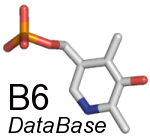|
|
| type |
Journal Article |
| authors |
Schuster, J., Knill, T., Reichelt, M., Gershenzon, J. and Binder, S. |
| title |
Branched-chain aminotransferase4 is part of the chain elongation pathway in the biosynthesis of methionine-derived glucosinolates in Arabidopsis. |
| journal |
Plant Cell 18 |
| Activity |
2.6.1.88 |
| Family |
2.6.1.88.a |
| sel |
selected |
| ui |
17056707 |
| year |
(2006) |
| volume |
18 |
| number |
10 |
| pages |
2664-79 |
| | |
|---|
| abstract |
As part of our analysis of branched-chain amino acid metabolism in plants, we analyzed the function of Arabidopsis thaliana BRANCHED-CHAIN AMINOTRANSFERASE4 (BCAT4). Recombinant BCAT4 showed high efficiency with Met and its derivatives and the corresponding 2-oxo acids, suggesting its participation in the chain elongation pathway of Met-derived glucosinolate biosynthesis. This was substantiated by in vivo analysis of two BCAT4 T-DNA knockout mutants, in which Met-derived aliphatic glucosinolate accumulation is reduced by approximately 50%. The increase in free Met and S-methylmethionine levels in these mutants, together with in vitro substrate specificity, strongly implicate BCAT4 in catalysis of the initial deamination of Met to 4-methylthio-2-oxobutyrate. BCAT4 transcription is induced by wounding and is predominantly observed in the phloem. BCAT4 transcript accumulation also follows a diurnal rhythm, and green fluorescent protein tagging experiments and subcellular protein fractions show that BCAT4 is located in the cytosol. The assignment of BCAT4 to the Met chain elongation pathway documents the close evolutionary relationship of this pathway to Leu biosynthesis. In addition to BCAT4, the enzyme methylthioalkylmalate synthase 1 has been recruited for the Met chain elongation pathway from a gene family involved in Leu formation. This suggests that the two pathways have a common evolutionary origin. |
| last changed |
2017/06/23 11:55 |
|











